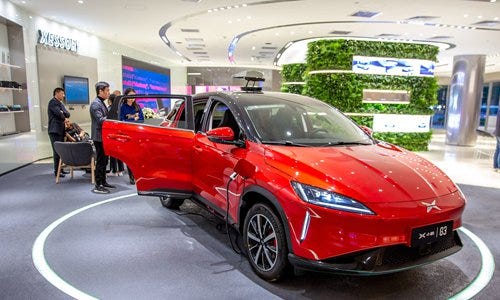China Might Regulate Artificial Intelligence Better
Xpeng, CCP and Facial recognition protection in China?
Hey Guys,
One thing a lot of analysts are missing about China’s crackdown on BigTech, its digital sector and data and privacy regulation is how China actually wants to be the leader in AI regulation.
This is hard for the anti-China followers to fully grasp. The winners in AI will make the rules around how AI is used and implemented globally. China’s regulations aren’t anti-capitalistic, they are pro-regulation. China after all is innovating a Neo-Surveillance Capitalism system that is likely to become the dominant version in the future of capitalism.
I have written extensively about this for the last three years. Today China’s ADR stocks are plummeting even further. Omicron variant will wreck havoc with China’s no-covid-19 policy and future GDP growth in 2022 and 2023.
The Global Times is widely seen as a policy mouthpiece source for the CCP. Recently there was an article that got my attention here it is. China urges regulating military use of AI, first time in UN history, showing global responsibility. I had just written an urgent Op-ed about this same topic the week earlier. You can read it here.
China also is evolving its policy for regulation around facial recognition. Xpeng, one of its star EV makers was recently fined. In July, 2021 China’s top court empowered people to say ‘no’ to facial recognition use by private businesses. The West conveniently didn’t cover this news much. It’s hard to know much about rule of law in China though, even for serious analysts. The integrity of some of the laws and regulations are debatable in a society where corruption, bribes and CCP dominated ethics are related at the intersection of business.
At a time when artificial intelligence (AI) technology is developing fast and has wide prospects in military use, China claims (in the Global Times story) first time proposed to the UN to regulate the military applications of AI during a conference held on Monday, raising concerns over the long-term impact and potential risks in such areas as strategic security, rules on governance and ethics, while also giving suggestions on how to resolve potential problems.
Chinese electric vehicle maker Xpeng has been ordered to pay RMB 100,000 ($15,710) in fines by China’s local market watchdog for collecting customers’ facial data without consent, Chinese media reported, as Beijing looks to tighten rules over user data privacy. That’s not a very big amount though.
On April 23, 2021, the National Information Security Standardization Technical Committee of China published a draft standard (in Chinese) on Security Requirements of Facial Recognition Data (the “Standard”). It’s not clear what has has evolved into by December, 2021.
Chinese authorities’ goal of tightening data privacy rules following a series of controversies over the use of consumers’ personal data seems to be serious and methodical. Chinese BigTech must comply to many new standards to create a more free internet where companies don’t use moats against other companies. The data of citizens also seems to be more an issue recently in China.
In July, 2021 China’s top court pushes back against arbitrary use of facial recognition data and clarifies rules amid widespread technology adoption. Leading Chinese AI companies like SenseTime, are caught in the middle. They were black listed by Washington recently, and so their IPO in Hong Kong is delayed or in doubt (since U.S. citizens wouldn’t be able to hold their stock).
The U.S. is using its white big boy network to try to limit and slow down China’s ascent to technological dominance. Omicron is so different from other variants, it’s quite likely an American bioweapon meant to slow down China’s economic growth. That’s a plausible theory. Read this story if you want to know just how different Omicron is. It’s not plausible it developed in an HIV patient and then went from animal to human. There’s too many mutations to believe this is a natural variant. But it will cause headaches for China’s no-Covid-19 policy that will be terrible for it in 2022.
After all is said and done, China still has a more dynamic system of consumerism, more tech startups with real products and a better ability to regulate AI or anything it wishes within its own boundaries. The bifurcation of the internet will mean China will create its own Metaverse as well.
With regards to Xpeng, the Alibaba association is clear. The Alibaba-backed EV maker was handed the fine for installing a total of 22 facial-recognition cameras in seven showrooms in Shanghai, according to a penalty bill (in Chinese) viewed by state-owned media outlet China News Service.
According to Technode, Xpeng reportedly used these cameras to collect more than 430,000 facial images during the first six months of this year without declaring the practice to the public, thus breaching China’s consumer protection law, the report said, citing the market watchdog.
As a stock analyst I think Xpeng is smarter than Nio. Xpeng said in a Tuesday statement to local media that it used the technology to gather information such as traffic flows, hoping to improve sales and better customer service. The company added that it had deleted all collected facial data and will strictly comply with regulations and protect customers’ personal information in the future.




